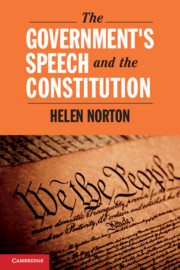18 results
42 - Truax v. Corrigan
- from Part VIII - Labor, Equal Protection, and Race
-
- Book:
- The Taft Court
- Published online:
- 19 October 2023
- Print publication:
- 09 November 2023, pp 1399-1429
-
- Chapter
- Export citation
6 - Ricci v. DeStefano
-
- Book:
- Post-Racial Constitutionalism and the Roberts Court
- Published online:
- 27 October 2022
- Print publication:
- 03 November 2022, pp 143-162
-
- Chapter
- Export citation
Stopping the Conversation about Isolation by Race and Poverty Before It Really Began: The Case of San Antonio Independent School District v. Rodriguez, 411 U.S. 1 (1973)
- from Part V - Justice
-
-
- Book:
- Critical Race Judgments
- Published online:
- 22 April 2022
- Print publication:
- 21 April 2022, pp 675-694
-
- Chapter
- Export citation
347 U.S. 483 (1954)BROWN et al.
-
- Book:
- Critical Race Judgments
- Published online:
- 22 April 2022
- Print publication:
- 21 April 2022, pp 25-38
-
- Chapter
- Export citation
275 U.S. 78Supreme Court of the United States
- from Part II - Participation and Access
-
- Book:
- Critical Race Judgments
- Published online:
- 22 April 2022
- Print publication:
- 21 April 2022, pp 235-245
-
- Chapter
- Export citation
323 U.S. 214Supreme Court of the United States
- from Part I - Membership and Inclusion
-
- Book:
- Critical Race Judgments
- Published online:
- 22 April 2022
- Print publication:
- 21 April 2022, pp 104-117
-
- Chapter
- Export citation
551 U.S. 701Supreme Court of the United States
- from Part II - Participation and Access
-
- Book:
- Critical Race Judgments
- Published online:
- 22 April 2022
- Print publication:
- 21 April 2022, pp 268-285
-
- Chapter
- Export citation
83 U.S. 36Supreme Court of the United States
- from Part I - Membership and Inclusion
-
- Book:
- Critical Race Judgments
- Published online:
- 22 April 2022
- Print publication:
- 21 April 2022, pp 118-149
-
- Chapter
- Export citation
418 U.S. 24Supreme Court of the United States
- from Part V - Justice
-
- Book:
- Critical Race Judgments
- Published online:
- 22 April 2022
- Print publication:
- 21 April 2022, pp 602-616
-
- Chapter
- Export citation
388 U.S. 1Supreme Court of the United States
- from Part IV - Intimate Choice and Autonomy
-
- Book:
- Critical Race Judgments
- Published online:
- 22 April 2022
- Print publication:
- 21 April 2022, pp 439-451
-
- Chapter
- Export citation
426 U.S. 229Supreme Court of the United States
- from Part III - Property and Space
-
- Book:
- Critical Race Judgments
- Published online:
- 22 April 2022
- Print publication:
- 21 April 2022, pp 377-402
-
- Chapter
- Export citation
274 U.S. 200Supreme Court of the United States
- from Part IV - Intimate Choice and Autonomy
-
- Book:
- Critical Race Judgments
- Published online:
- 22 April 2022
- Print publication:
- 21 April 2022, pp 514-522
-
- Chapter
- Export citation
403 U.S. 217Supreme Court of the United States
- from Part III - Property and Space
-
- Book:
- Critical Race Judgments
- Published online:
- 22 April 2022
- Print publication:
- 21 April 2022, pp 337-346
-
- Chapter
- Export citation
Supreme Court of the United States
- from Part II - Participation and Access
-
- Book:
- Critical Race Judgments
- Published online:
- 22 April 2022
- Print publication:
- 21 April 2022, pp 246-267
-
- Chapter
- Export citation
509 U.S. 630Supreme Court of the United States
- from Part II - Participation and Access
-
- Book:
- Critical Race Judgments
- Published online:
- 22 April 2022
- Print publication:
- 21 April 2022, pp 185-197
-
- Chapter
- Export citation
6 - San Antonio, Inequity, and the Human Struggle
-
- Book:
- Badges and Incidents
- Published online:
- 09 September 2019
- Print publication:
- 17 October 2019, pp 107-136
-
- Chapter
- Export citation
3 - The Government’s Speech and Equality
-
- Book:
- The Government's Speech and the Constitution
- Published online:
- 12 August 2019
- Print publication:
- 22 August 2019, pp 93-126
-
- Chapter
- Export citation

The Government's Speech and the Constitution
-
- Published online:
- 12 August 2019
- Print publication:
- 22 August 2019

